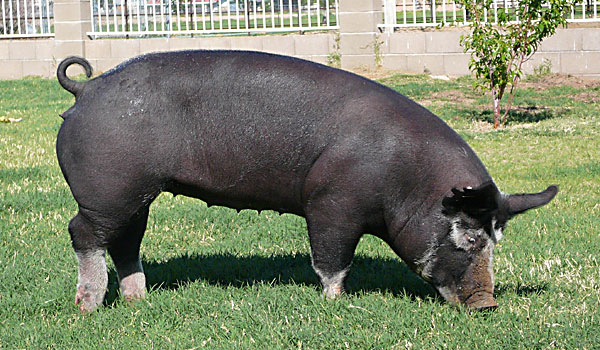
The Berkshire breed history…
CROMWELL’S troops when quartered in Reading, made reference to a locally bred pig renowned for its size and the quality of its bacon and ham. This turned out to be one of the earliest records of the Berkshire breed.
These pigs were larger and coarser than today’s Berkshire. Their color varied from black to sandy red; they were also sometimes spotted and had variable white patches.
However, the breed was influenced by the introduction of Chinese and Siamese blood, which resulted in the development of the Berkshire we are familiar with today. This is a smaller animal, black in color, with prick ears, white socks, white tip to tail and flash on face.
Important strides in breed improvement took place between 1820 and 1830, much of which is attributed to Lord Barrington. During the 19th century the breed became very popular, enjoying patronage from the aristocracy, including Queen Victoria.
Its popularity was reflected in the show ring as by 1877, Smithfield offered separate Berkshire classes and during the last 17 years of the 18th century, the breed produced 12 Smithfield champions, including pigs exhibited by members of the Royal Family.
During 1823 the first Berkshire was exported to the USA. This trend continued throughout that century and then at the end of the 19th century, herds were also established in Australia and New Zealand. From that time, and during the first half of the 20th century, the breed grew in popularity reflected by successes at many leading shows.
But, as with all colored pig breeds, the Berkshire suffered a serious decline in popularity following World War II when the demand for leaner bacon from white-skinned pigs increased and then in the 1960s with the development of breeding companies that favored white breeds.
However, due to a few loyal stalwarts, the Berkshire survived. Today’s increasing interest in traditional meat produced extensively has renewed interest in the breed. Although it is a colored breed, the meat dresses out white and, as this is an early-finishing breed, an ideal carcass weighs between 36kg and 45kg.
A number of breeders have developed their own specialized markets for Berkshire pig meat and Berkshire breeding stock are also in demand overseas – especially in Japan – where the breed is very popular and is marketed as Black Pork at a premium price. Japanese buyers still consider Berkshires from Britain to have the best taste and flavor.
There have been six boars imported over the past fifty years from Australia and New Zealand. Semen has also been sourced from USA. These importations of new blood – all descended from the original English Berkshire – as well as grading up three female lines has helped broaden the breed’s genetic base. Today, there are six male and nine female bloodlines available to breeders.



